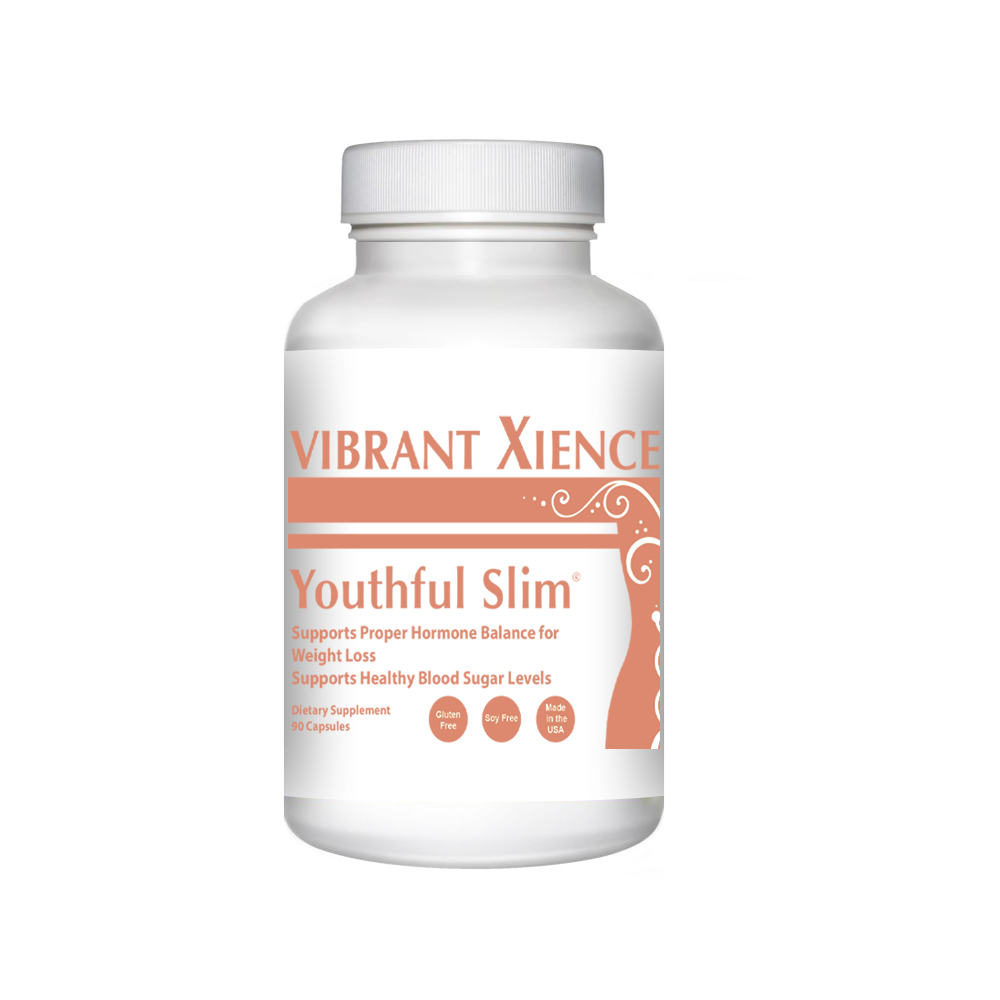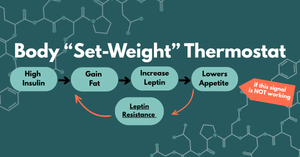Ever feel like your body's playing a cruel joke on you? You're not alone in this metabolic mayhem. Let's dive into the world of hormones that might be behind your weight management woes.
Meet the Troublemakers: Insulin and Leptin
Insulin: The Overzealous Party Planner
Imagine insulin as your body's overeager party planner, always trying to store energy for a rainy day. When insulin sensitivity decreases, it's like your cells have started ignoring insulin's frantic attempts to usher glucose out of your bloodstream. The result? Your body produces more insulin, leading to a vicious cycle that can make maintaining a healthy weight feel like teaching a cat to fetch [1].
Why It's So Darn Hard to Manage Weight with Suboptimal Insulin Function
- Your body becomes an expert at storing fat (thanks, but no thanks).
- Your metabolism slows down like it's on permanent vacation.
- You feel hungrier than a bear after hibernation, even when you've eaten.
It's like trying to drain a pool with a teaspoon while someone's still filling it with a hose. Sometimes, diet and exercise alone just don't cut it. This is where a little extra help might be needed – think of it as calling in backup for your metabolism.
The Insulin Genetic Lottery
Ever wonder why your friend can inhale pizza like a vacuum while you gain weight just by looking at a cookie? Blame it on genetics (thanks, ancestors!). Some genes associated with insulin function include:
- IRS1: When this gene misbehaves, it's like your cells have put insulin on their spam list [2].
- PPAR-gamma: The "thrifty gene" that's great for surviving famines, not so great for beach season [3].
- TCF7L2: This gene can make your pancreas lazy about producing insulin [4].
Leptin: The Misunderstood Messenger
Now, let's talk about leptin – the hormone equivalent of that friend who's always trying to get you to leave the all-you-can-eat buffet. Produced by your fat cells, leptin is supposed to be your body's way of saying, "Hey brain, we've got enough energy stored up here. Time to burn some fat and maybe skip that second slice of cake" [5].
But here's where things get tricky. When leptin signaling isn't optimal, it's like your brain has put leptin on mute. The message is being sent loud and clear, but your brain is wearing noise-canceling headphones and can't hear a thing [6]. The outcome? You're left staring at an empty pint of ice cream, wondering why you still feel hungry enough to eat a horse (please don't, though).
The Leptin Genetic Lottery: When Your Genes Crash the Party
Just like some people are born with a natural talent for juggling or yodeling, others might have genetic variations that affect their leptin levels or signaling. Here's the scoop:
- The LEP Gene: Mutations in this gene can lead to congenital leptin deficiency. It's like being born without an internal "fullness" gauge [7].
- The LEPR Gene: Variations here can affect leptin receptors, making them about as useful as a chocolate teapot when it comes to sensing leptin [8].
- The FTO Gene: Often called the "fat mass and obesity-associated gene," variations in FTO can influence leptin levels and body mass index. It's like having a mischievous leptin gremlin in your genetic makeup [9].
The Hormonal Rollercoaster: From Perimenopause to Menopause
Ladies, buckle up. The journey from perimenopause to menopause is like a hormonal theme park ride – thrilling, unpredictable, and occasionally making you want to scream.
Perimenopause: When Progesterone and Testosterone Start the Party
Perimenopause is like the pre-game to the main menopause event. It's when progesterone and testosterone decide to peace out early, leaving you with some unexpected party favors:
- Progesterone: The Chill Pill That Ghosts You
- As progesterone levels drop, it's like your body's natural chill pill has gone on vacation. This can lead to:
- Increased insulin resistance (hello, stubborn belly fat) [22]
- Changes in appetite regulation (suddenly, that whole cake looks tempting) [23]
- Mood swings that rival a teenager's (from zen master to fire-breathing dragon in 3.5 seconds) [24]
- As progesterone levels drop, it's like your body's natural chill pill has gone on vacation. This can lead to:
- Testosterone: Not Just for the Boys
- Contrary to popular belief, women need testosterone too. As it declines:
- You might lose muscle mass faster than you can say "squats" [25]
- Your metabolism might slow down to a turtle's pace [26]
- Energy levels can plummet (making the couch look more appealing than ever) [27]
- Contrary to popular belief, women need testosterone too. As it declines:
These hormonal changes can affect how your body responds to insulin and leptin, potentially making weight management feel like solving a Rubik's cube blindfolded [28].
Menopause: The Grand Finale (Or Is It Just the Beginning?)
When Estrogen Decides to Exit Stage Left
As you transition into menopause, estrogen joins the exodus:
- Estrogen Nosedive: The drop in estrogen during menopause can affect both insulin and leptin production and sensitivity. It's like your hormones are playing musical chairs, and these two are left without seats [29].
- Body Fat Redistribution: Menopause often comes with a shift in where your body stores fat, which can influence both insulin and leptin levels and signaling [30]. Suddenly, your body thinks your waistline is prime real estate for new fat cells.
Remember, while these hormonal changes can feel like your body's betraying you, they're a natural part of aging. Understanding them is the first step in finding strategies to support your body's evolving needs.
Age: When Time Isn't on Your Hormones' Side
As we age, our relationship with hormones becomes more complicated than a soap opera plot:
- Middle Age Spread: Around mid-life, our bodies might start ignoring insulin and leptin signals more frequently. It's like these hormones are using a flip phone while your body has upgraded to 5G [15].
- Sarcopenia: Age-related muscle loss can affect both insulin and leptin sensitivity. Less muscle means your body might not respond to these hormones' messages as enthusiastically [16].
The Hormonal Tightrope Walk
Getting your hormone levels just right is like trying to achieve the perfect balance in your morning coffee – not too weak, not too strong. When these hormones aren't functioning optimally, it can affect your body's ability to manage weight effectively [17].
Are You on a Hormonal Roller Coaster?
You might be dealing with hormonal imbalances if:
- Your midsection has more rolls than a bakery
- Your mood swings are giving everyone around you whiplash
- Your energy levels are lower than a limbo stick at a dachshund party
- Your idea of cardio is reaching for the TV remote
- You have a Ph.D. in procrastination when it comes to exercise
- Your stress levels are higher than a cat in a room full of rocking chairs
- You consider sleep an optional activity, like flossing or using your turn signal
The Unfairness of It All
Let's face it – metabolic health isn't a level playing field. While some people can eat their weight in pasta without gaining an ounce, others struggle to maintain a healthy weight on diets stricter than a boarding school's rules. It's enough to make you want to throw your scale out the window.
But before you do, remember this: everyone's body is unique, and what works for one person might not work for another. It's not about fairness; it's about finding what works for you.
A Ray of Hope: Balancing the Scales
Here's the good news: understanding your body's quirks is half the battle. The other half? Finding the right support system. This might include:
- Tailored nutrition plans that work with your body, not against it.
- Exercise routines that support your metabolism.
- Stress management techniques (because cortisol is not your friend).
- And sometimes, a little extra help in the form of dietary supplements.
Remember, there's no shame in needing a boost. It's like using a GPS when you're lost – sometimes, you need tools to get back on track.
Enter Youthful Slim: Your Metabolic Wingman
While we can't change your genes or turn back the clock on aging, we can give your body a helping hand. Youthful Slim is designed to support your body's natural processes and help maintain hormonal balance.
These statements have not been evaluated by the Food and Drug Administration. This product is not intended to diagnose, treat, cure, or prevent any disease.
The A-Team of Ingredients
- Wild Craft Himalayan Berberine: Not just a fancy name, this compound may help support healthy blood sugar levels already within the normal range [18].*
- GTF Excell Chromium: This form of chromium is designed to support healthy glucose metabolism [19].*
- DNF-10 (Eatless): This brewer's yeast extract may help support a healthy appetite and contribute to maintaining consistent energy levels throughout the day [20,21].*
What Youthful Slim May Offer
Sarah, a 45-year-old professional, shared her experience: "After incorporating Youthful Slim into my routine, I noticed subtle but meaningful changes. My energy levels became more consistent, and I found myself making healthier food choices without feeling deprived. It wasn't an overnight transformation, but over time, I felt more in tune with my body."
Remember, Youthful Slim is not a miracle solution, but rather a supportive tool in your journey towards hormonal balance. Here's what you might experience:
- A gradual shift in your relationship with food
- More stable energy levels throughout the day
- A sense of overall well-being
Individual results may vary. Youthful Slim is designed to support a healthy metabolism when used in conjunction with a balanced diet and regular exercise.
Using Youthful Slim Effectively
For optimal results, consider the following guidelines:
| Weight Range | Daily Dosage | Timing |
|---|---|---|
| Under 150 lbs | 2 capsules | 1 capsule twice daily |
| 150-180 lbs | 4 capsules | 2 capsules twice daily |
| Over 180 lbs | 6 capsules | 3 capsules twice daily |
Remember, consistency is key. Youthful Slim works best when incorporated into a holistic approach to health, including:
- Staying well-hydrated
- Embracing a balanced, nutrient-rich diet
- Engaging in regular physical activity
- Prioritizing quality sleep
- Managing stress through mindfulness practices
Always consult with a healthcare professional before starting any new dietary supplement regimen, especially if you have a medical condition or are taking medications.
The Bottom Line: Your Journey, Your Rules
Remember, your wellness journey is as unique as you are. It's not about comparing yourself to others or feeling guilty about needing extra support. It's about finding what works for your body and embracing it.
So, whether you're navigating the choppy waters of perimenopause, riding the menopause wave, or just trying to understand why your metabolism seems to have a mind of its own, know this: you're not alone, and there are tools out there to help you. Here's to finding your balance and showing those hormones who's boss!
References
- Samuel VT, Shulman GI. The pathogenesis of insulin resistance: integrating signaling pathways and substrate flux. J Clin Invest. 2016;126(1):12-22.
- Rung J, et al. Genetic variant near IRS1 is associated with type 2 diabetes, insulin resistance and hyperinsulinemia. Nat Genet. 2009;41(10):1110-1115.
- Yen CJ, et al. Molecular scanning of the human peroxisome proliferator activated receptor gamma (hPPAR gamma) gene in diabetic Caucasians: identification of a Pro12Ala PPAR gamma 2 missense mutation. Biochem Biophys Res Commun. 1997;241(2):270-274.
- Grant SF, et al. Variant of transcription factor 7-like 2 (TCF7L2) gene confers risk of type 2 diabetes. Nat Genet. 2006;38(3):320-323.
- Friedman JM. Leptin and the regulation of body weight. Keio J Med. 2011;60(1):1-9.
- Myers MG Jr, Leibel RL, Seeley RJ, Schwartz MW. Obesity and leptin resistance: distinguishing cause from effect. Trends Endocrinol Metab. 2010;21(11):643-651.
- Wasim M, Awan FR, Najam SS, Khan AR, Khan HN. Role of Leptin Deficiency, Inefficiency, and Leptin Receptors in Obesity. Biochem Genet. 2016;54(5):565-572.
- Brito N, Fonseca M, Dinis I, Mirante A. Metabolic factors in obesity. J Pediatr Endocrinol Metab. 2010;23(1-2):97-100.
- Milaneschi Y, Simmons WK, van Rossum EFC, Penninx BW. Depression and obesity: evidence of shared biological mechanisms. Mol Psychiatry. 2019;24(1):18-33.
- Vieira-Potter VJ, Zidon TM, Padilla J. The role of exercise in modulating molecular mechanisms of cognitive aging. Ageing Res Rev. 2022;80:101679.
- Bado A, Levasseur S, Attoub S, et al. The stomach is a source of leptin. Nature. 1998;394(6695):790-793.
- Al-Safi ZA, Polotsky AJ. Obesity and menopause. Best Pract Res Clin Obstet Gynaecol. 2015;29(4):548-553.
- Lizcano F, Guzmán G. Estrogen Deficiency and the Origin of Obesity during Menopause. Biomed Res Int. 2014;2014:757461.
- Crujeiras AB, Carreira MC, Cabia B, Andrade S, Amil M, Casanueva FF. Leptin resistance in obesity: An epigenetic landscape. Life Sci. 2015;140:57-63.
- Yin J, Xing H, Ye J. Efficacy of berberine in patients with type 2 diabetes mellitus. Metabolism. 2008;57(5):712-717.
- Yazaki Y, Faridi Z, Ma Y, et al. A pilot study of chromium picolinate for weight loss. J Altern Complement Med. 2010;16(3):291-299.
- Jung EY, Hong YH, Kim JH, Park Y, Bae SH, Chang UJ, Suh HJ. Effects of yeast hydrolysate on hepatic lipid metabolism in high-fat-diet-induced obese mice: yeast hydrolysate suppresses body fat accumulation by attenuating fatty acid synthesis. Ann Nutr Metab. 2012;61(2):89-94.
- Jung EY, Lee HS, Lee HJ, Kim JM, Lee KW, Suh HJ. Feeding silk protein hydrolysates to C57BL/KsJ-db/db mice improves blood glucose and lipid profiles. Nutr Res. 2010;30(11):783-790.
- Kalkhoff RK. Metabolic effects of progesterone. Am J Obstet Gynecol. 1982;142(6 Pt 2):735-738.
- Hirschberg AL. Sex hormones, appetite and eating behaviour in women. Maturitas. 2012;71(3):248-256.
- Toffol E, Heikinheimo O, Partonen T. Hormone therapy and mood in perimenopausal and postmenopausal women: a narrative





